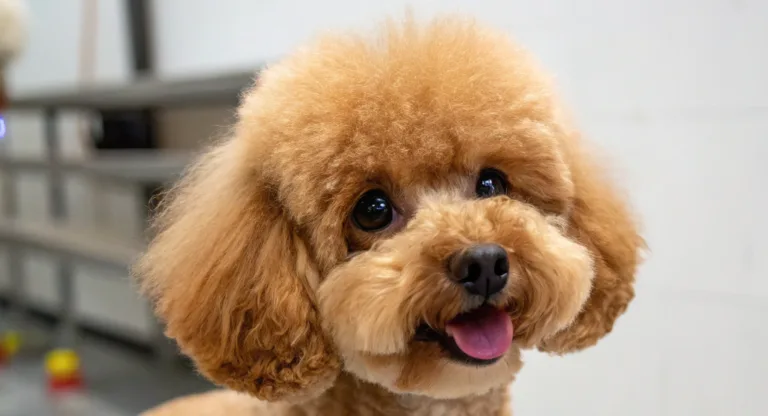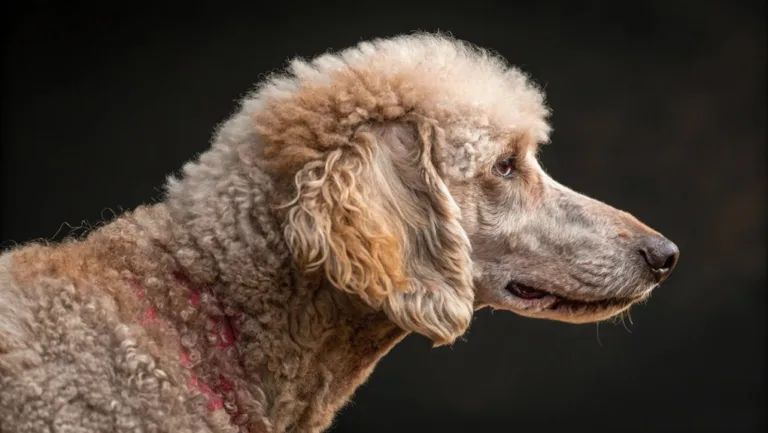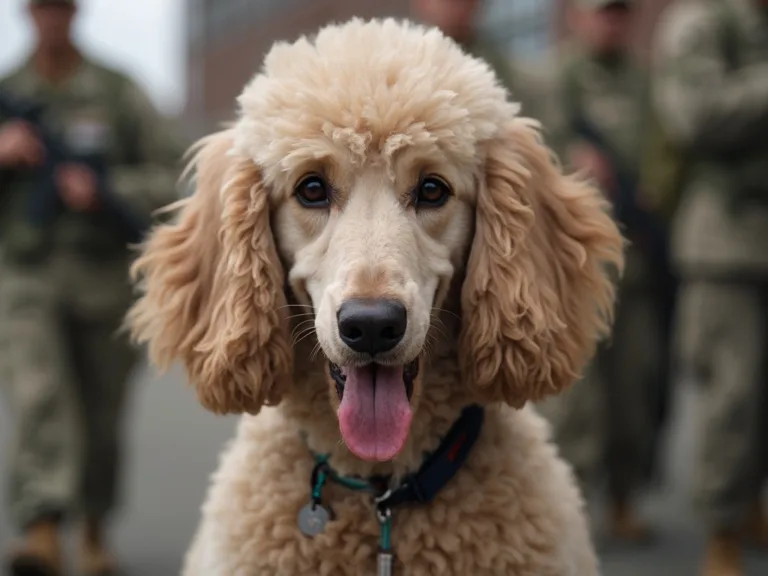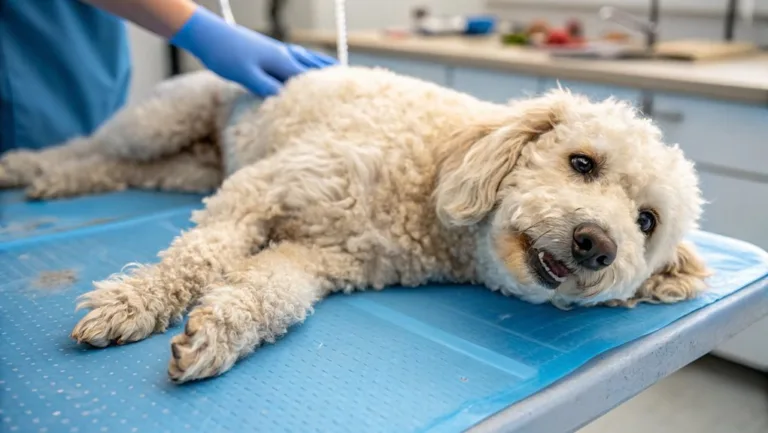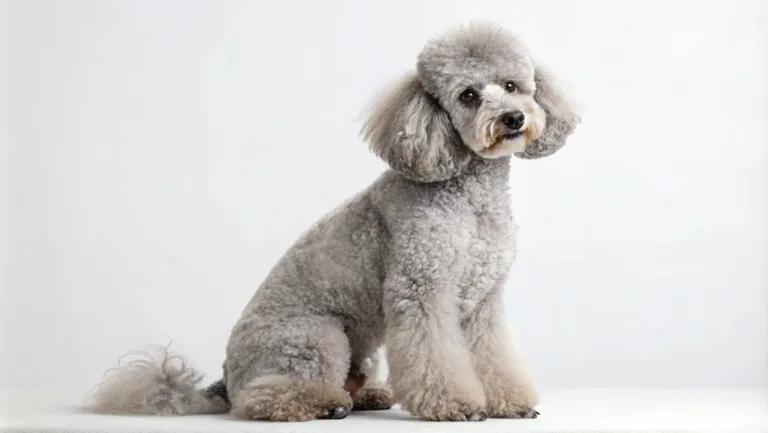Are Poodles Good Hunting Dogs?

Yes, Poodles are excellent hunting dogs with a rich heritage as water retrievers.
You’ll find they’re naturally skilled at waterfowl and upland game hunting, thanks to their water-resistant coats, strong swimming abilities, and keen sense of smell.
While many people view them as elegant show dogs, Standard Poodles particularly excel in the field with their intelligence, trainability, and athletic build.
They can match or outperform other hunting breeds in water retrieves and game tracking.
Their combination of physical traits and instincts makes them versatile hunting companions.
There’s much more to discover about these capable sporting dogs than meets the eye.
The Poodle’s Hunting Heritage
Three key historical facts reveal the Poodle’s true hunting heritage.
- First, the breed’s name derives from the German word “pudelin” (to splash in water) and French word “caniche” (duck dog), both pointing to their original purpose as water dogs.
- Second, during the Middle Ages, Standard Poodles worked alongside hunters as skilled retrievers, particularly excelling in duck hunting long before becoming show dogs.
You might be surprised to learn that the Poodle breed was classified by both the United Kennel Club (UKC) and North American Hunting Retriever Association (NAHRA) as a sporting breed from the start.
Their hunting talents were so valued that hunters specifically bred them for their water-retrieving abilities, intelligence, and trainability.
What makes the standard poodle a good hunting dog? is it the poodle coat?

The hunting poodle’s legacy continues today, with many Standard Poodles participating in hunt tests and field trials.
Their water-resistant coat, initially trimmed in the distinctive pom-pom style, served a practical purpose – protecting essential organs while allowing freedom of movement in cold water.
This natural swimming ability, combined with their retrieving instincts, made them indispensable partners to hunt waterfowl across Europe.
Since early Europe, they have consistently regarded the poodle a hunting dog.
Natural Hunting Dog Abilities
Poodles possess a remarkable set of natural hunting abilities that often surprise those unfamiliar with the breed’s working heritage.
While many people associate this dog breed with fancy dog shows, they’re naturally equipped with the instincts and physical attributes of a true gun dog.
Their excellent swimming ability, natural retrieving drive, and keen sense of smell make them particularly well-suited to hunt waterfowl.
Their water-resistant coat, though requiring regular maintenance, provides excellent protection when working in cold waters.
You’ll find that poodles demonstrate impressive stamina in the field, with strong marking abilities and a natural inclination to please their handlers.
During hunt tests, they often showcase their intelligence by quickly adapting to different hunting scenarios and remembering multiple bird falls.
The breed’s success in dog training stems from their high intelligence and enthusiasm to learn.
They’re quick to pick up commands and show good hunting instincts when properly trained.
While they may not be as common in the field as Labradors or Springers, poodles can match or exceed other hunting breeds in performance when their natural abilities are properly developed.
Training for the Field
Training a poodle for field work requires a thoughtful balance between structure and variety to maintain their engagement.
You’ll need to understand that while any poodle variety can be trained, the standard size excels more naturally than a miniature poodle in hunting scenarios.
Their high intelligence means they’ll quickly grasp concepts, but may become bored with repetitive drills.
To prepare your sporting dog for the field, you’ll need to maintain their poodle coat appropriately.
The traditional poodle cut isn’t just for show – it helps protect the dog when retrieving in cold water and moving through dense brush.
Your poodle must be trimmed regularly to maintain a practical working length of about one inch.
Understanding poodle temperament is essential for successful field training. They’re sensitive dogs that respond best to positive reinforcement and clear direction.
You’ll want to incorporate varied training scenarios to keep them mentally stimulated while building their hunting skills.
Focus on water work, scent training, and retrieval exercises, but mix up the locations and challenges.
This hunting dog breed thrives when training sessions are engaging and rewards are consistent.
Popular Hunting Activities

A well-trained standard poodle can excel in multiple hunting activities that showcase their natural abilities.
You’ll find these versatile dogs particularly effective in waterfowl hunting, where they’ll quietly wait in a duck blind before springing into action to retrieve fallen birds.
Unlike a toy poodle, the standard poodle’s size and strength make it ideal for these demanding tasks.
Upland game hunting is another area where you’ll see a poodle’s hunting talents shine.
They’re excellent at flushing and retrieving pheasants, quail, and other game birds.
As noted by poodle breeder and hunter Dr. Grace Blair, poodles have earned the highest titles in hunt tests, proving their capabilities in the field.
While many kennel clubs initially classified poodles as non-sporting dogs, organizations like UKC and NAHRA have always considered the poodle a sporting breed.
You can train your poodle for both land and water retrieves, tracking wounded game, and working in various weather conditions.
Though their hunting prowess often remains hidden from the general public, these intelligent dogs continue to prove themselves as capable hunting companions across multiple disciplines.
Physical Traits and Endurance

With their lean and muscular build, standard poodles possess remarkable physical traits that make them exceptional hunting companions.
Standing 22-26 inches at the withers, they’re built for endurance and agility, with a body structure that enables them to navigate challenging terrains and water environments effectively.
You’ll find that a standard poodle has excellent credentials when it comes to physical stamina.
While you might wonder about a dog with all that hair performing in the field, their unique coat actually serves a purpose – it protects the dog from cold water and harsh vegetation.
Most hunters don’t maintain those elaborate dog show coifs that move through the ring. Instead, poodles clip them down pretty short for hunting, typically to about an inch all over.
Don’t let stories of even a miniature poodle tangling with an outraged duck fool you – it’s the standard poodle that excels in hunting scenarios.
Their waterproof coat aids the dog when retrieving water, while their muscular frame and athletic build allow them to work tirelessly throughout a full day of hunting.
Water Performance and Skills

Since their ancestral roots as water retrievers, poodles have maintained exceptional water performance abilities that make them naturals in waterfowl hunting scenarios.
While the CKC recognized the toy poodle as a companion breed, they’ve always considered the standard poodle a hunting dog, particularly for water retrieval work.
Your poodle also needs a training program focused on water work. Since the CKC allowed poodles to partake in retriever trials, many owners have discovered their dogs’ natural talent for marking, swimming, and retrieving in various water conditions.
You’ll notice they maintain composure in cold water and show remarkable endurance during extended water retrievals, making them excellent choices for serious waterfowl hunters.
You’ll find that standard poodles excel in water-based activities due to their waterproof coat and strong swimming abilities.
Those fancy trims you see aren’t just for show – they actually protect the dog while swimming by reducing drag and maintaining body temperature.
Unlike breeds that leave dog hairs on the rug, poodles’ non-shedding coats make them ideal for dog lovers who are allergic to most breeds.
Common Misconceptions About Hunting Poodle Temperament

Despite their proven capabilities in the water, poodles often face unfair stereotypes as prissy show dogs rather than serious hunting companions.
You’ll frequently hear misconceptions about the standard poodle being too delicate or lacking the drive for hunting, but historical evidence and modern achievements prove otherwise.
Don’t let the poodle’s reputation in entertainment and show rings fool you. The poodle breed possesses a strong hunting heritage, with their distinctive coat originally designed for protection during water retrieves, not for appearance.
The poodle temperament combines intelligence, athleticism, and determination – traits essential for successful hunting dogs.
You’ll find that poodles consistently demonstrate their hunting abilities in formal hunting tests, often surprising skeptics with their performance.
While some may dismiss a poodle as a hunting dog due to their elegant appearance, these dogs maintain the same working drive as traditional hunting breeds.
Their success in the field comes from their natural retrieving instincts, water enthusiasm, and exceptional trainability.
When properly trained and given the opportunity, a standard poodle can perform just as effectively as any other sporting breed.
Finding Gun Dog Bred Poodle Lines
When searching for a hunting-bred poodle, you’ll need to look beyond typical show lines to find breeders specifically focused on working ability.
While you might’ve never seen a poodle hunt or may associate the breed with those outlandish dog show trims, there are dedicated breeders maintaining working lines.
Start by researching kennels like Louter Creek Hunting Poodles, which have developed lines specifically for hunting performance.
You’ll want to connect with breed clubs that sponsor the poodle in hunting events and reach out to experienced handlers who actively work with the breed.
Don’t waste time listening to some dog enthusiasts who dismiss poodles as mere show dogs – these breeds were originally developed for hunting.
Look for breeders who regularly train and test their standard poodles to participate in hunt tests and field trials.
Ask to see hunting titles, working certificates, and field achievements in their breeding stock’s pedigrees.
Request videos of their dogs working in the field and arrange to observe training sessions.
The right breeder will prioritize working ability, temperament, and health over appearance while maintaining breed standards.
Conclusion
You’ll find that Poodles aren’t just elegant show dogs – they’re capable hunting companions with a rich sporting heritage.
Whether you’re duck hunting or participating in field trials, these intelligent dogs can match the performance of traditional hunting breeds.
Don’t let their fancy reputation fool you; with proper training and the right bloodlines, your Poodle can excel in the field while challenging common misconceptions about this versatile breed.

